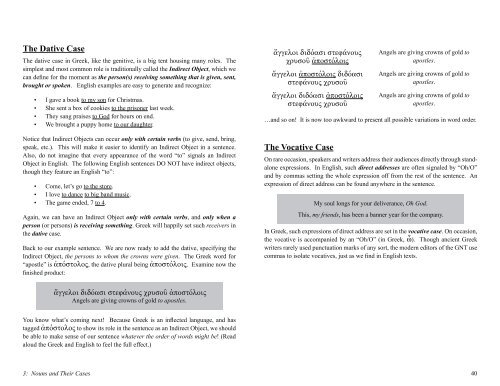Elementary New Testament Greek, 2014a
Elementary New Testament Greek, 2014a
Elementary New Testament Greek, 2014a
You also want an ePaper? Increase the reach of your titles
YUMPU automatically turns print PDFs into web optimized ePapers that Google loves.
The Dative Case<br />
The dative case in <strong>Greek</strong>, like the genitive, is a big tent housing many roles. The<br />
simplest and most common role is traditionally called the Indirect Object, which we<br />
can dene for the moment as the person(s) receiving something that is given, sent,<br />
brought or spoken. English examples are easy to generate and recognize:<br />
<br />
<br />
<br />
<br />
I gave a book to my son for Christmas.<br />
She sent a box of cookies to the prisoner last week.<br />
They sang praises to God for hours on end.<br />
We brought a puppy home to our daughter.<br />
Notice that Indirect Objects can occur only with certain verbs (to give, send, bring,<br />
speak, etc.). This will make it easier to identify an Indirect Object in a sentence.<br />
Also, do not imagine that every appearance of the word “to” signals an Indirect<br />
Object in English. The following English sentences DO NOT have indirect objects,<br />
though they feature an English “to”:<br />
Come, let’s go to the store.<br />
I love to dance to big band music.<br />
The game ended, 7 to 4.<br />
Again, we can have an Indirect Object only with certain verbs, and only when a<br />
person (or persons) is receiving something. <strong>Greek</strong> will happily set such receivers in<br />
the dative case.<br />
Back to our example sentence. We are now ready to add the dative, specifying the<br />
Indirect Object, the persons to whom the crowns were given. The <strong>Greek</strong> word for<br />
“apostle” is , the dative plural being . Examine now the<br />
nished product:<br />
<br />
<br />
<br />
<br />
<br />
<br />
Angels are giving crowns of gold to<br />
apostles.<br />
Angels are giving crowns of gold to<br />
apostles.<br />
Angels are giving crowns of gold to<br />
apostles.<br />
…and so on! It is now too awkward to present all possible variations in word order.<br />
The Vocative Case<br />
On rare occasion, speakers and writers address their audiences directly through standalone<br />
expressions. In English, such direct addresses are often signaled by “Oh/O”<br />
and by commas setting the whole expression off from the rest of the sentence. An<br />
expression of direct address can be found anywhere in the sentence.<br />
My soul longs for your deliverance, Oh God.<br />
This, my friends, has been a banner year for the company.<br />
In <strong>Greek</strong>, such expressions of direct address are set in the vocative case. On occasion,<br />
the vocative is accompanied by an “Oh/O” (in <strong>Greek</strong>, ). Though ancient <strong>Greek</strong><br />
writers rarely used punctuation marks of any sort, the modern editors of the GNT use<br />
commas to isolate vocatives, just as we nd in English texts.<br />
<br />
Angels are giving crowns of gold to apostles.<br />
You know what’s coming next! Because <strong>Greek</strong> is an inected language, and has<br />
tagged to show its role in the sentence as an Indirect Object, we should<br />
be able to make sense of our sentence whatever the order of words might be! (Read<br />
aloud the <strong>Greek</strong> and English to feel the full effect.)<br />
3: Nouns and Their Cases<br />
40


















